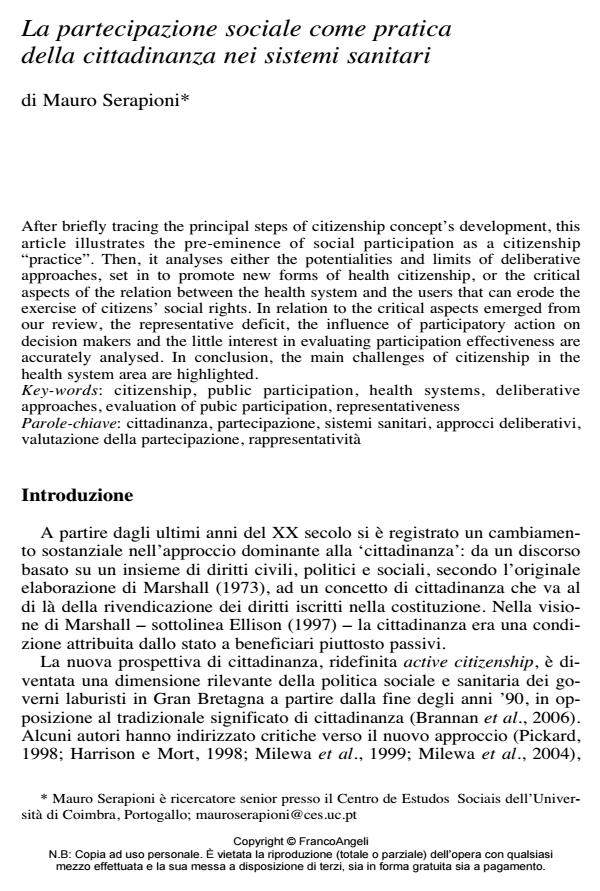La partecipazione sociale come pratica della cittadinanza nei sistemi sanitari
Titolo Rivista SALUTE E SOCIETÀ
Autori/Curatori Mauro Serapioni
Anno di pubblicazione 2011 Fascicolo 2011/2
Lingua Italiano Numero pagine 16 P. 34-49 Dimensione file 117 KB
DOI 10.3280/SES2011-002004
Il DOI è il codice a barre della proprietà intellettuale: per saperne di più
clicca qui
Qui sotto puoi vedere in anteprima la prima pagina di questo articolo.
Se questo articolo ti interessa, lo puoi acquistare (e scaricare in formato pdf) seguendo le facili indicazioni per acquistare il download credit. Acquista Download Credits per scaricare questo Articolo in formato PDF

FrancoAngeli è membro della Publishers International Linking Association, Inc (PILA)associazione indipendente e non profit per facilitare (attraverso i servizi tecnologici implementati da CrossRef.org) l’accesso degli studiosi ai contenuti digitali nelle pubblicazioni professionali e scientifiche
We’re living in times of deep and fast changes that are silently importing into the everyday lives of people new and heavy difficulties. The ideology of no limits and the underlined compulsion to capture all the opportunities, produce a breathless every-day-life, far away from the real ability of many families who (also before the recent financial crisis) are dealing with the difficulty to get the account square. These difficulties produce weakness and illness (particularly depression) especially for a particular social group that could be defined as "impoverished middle class" or "new vulnerable". The area of the new vulnerable not only is shifting into poverty, but also, in relationship with the concept of citizenship, shows a growing hostility towards all that is "established" (State, local authorities, third sector and trade unions). Established institutions are, in fact, simply not representatives and this could means be more sensible to those political languages that try to simplify the reality. The participatory process set up in the last years around the complexity of the social issues, health, environment and urban planning, could be read as valid opportunity to engage, activate and maintain these resources. But this is possible only using appropriate methodological tools able to reinforce the contemporary forms of democracy (now so far to be strong and participate). This requires the spreading of new capabilities among operators and managers of the public and no-for-profit sector. But also an effort for the University that may fill the delete of skills in this field.
Parole chiave:Vulnerabilità, politiche partecipative, welfare, sviluppo di comunità
Mauro Serapioni, La partecipazione sociale come pratica della cittadinanza nei sistemi sanitari in "SALUTE E SOCIETÀ" 2/2011, pp 34-49, DOI: 10.3280/SES2011-002004